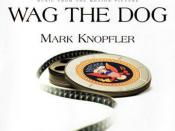politics and film
The purpose of film is to enlighten, inform, and entertain. Throughout the production of a film many things occur, ranging from running out of money to scandals. All events during production and release play big a part in the way the ideas of the producer and director are presented. The survivability of a film rests on factors that occur during production and by the external factors when the film is released. The films Wag the Dog, Triumph of the Will, and Black October; show that a film is comprised of the ideological beliefs of the director and producer. Their decisions are often influenced by the filters imposed by the environment in which the film is made, and are also affected by the type of film made; either fictional or documentary.
The Ideology in the films Wag the Dog, Black October, and Triumph of the Will is clearly depicted in various ways.
Ideology is basically the beliefs, the structure of thought, and the reasoning of a person. Ideology of a film is usually a reflection of the director's ideology. In Wag the Dog, the director Levinson constantly pushes the idea that TV dictates reality. He highlights this point most in the scene where the other candidate reveals that their pretend war in Albania is over and De Niro's character say "its over I just saw it on TV". In Black October the director McKenna, attempted to forgo the addition of his ideas and tried to show both sides of the story as best as he could. This was displayed in his interviews with both parties involved and his attempts to use as much historical fact as he could. In Triumph of the Will Riefenstahl tries to make Hitler into a Demi-god throughout her film. She does...


